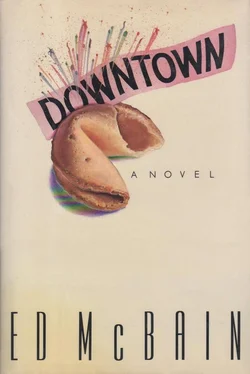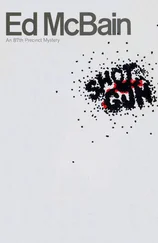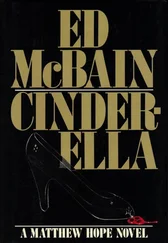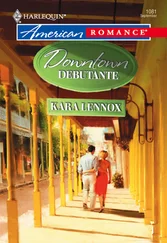He knocked.
No answer.
He knocked again.
He shook his head.
“Damn it,” he said.
“What do we do now?”
“I’d like to get in there,” he said.
“Do you know how to do something like that?” she asked.
“Something like what?”
“Opening a door with a credit card?”
“No. Anyway, they stole my credit cards.”
He was beginning to get angry all over again. Just thinking about what had happened to him since seven o’clock last night made him angry. Not knowing why these things were happening to him made him angry. Not knowing who was doing these things to him made him angry. And now Nichols not being here made him even angrier.
“Do you have a credit card?” he asked.
“Yes, but you just said...”
“I can learn.”
She dug in her shoulder bag, found her wallet, and took from it an American Express card. He looked at the card, looked at the place in the jamb where the door fit snugly into it, grabbed the knob in his hand, slid the card between door and jamb, twisted the knob — and the door opened.
He looked at the door.
He looked at the credit card.
“Boy,” Connie said, “you’re some fast learner.”
He eased the door open the rest of the way. There were lights on in the living room. A lighted Christmas wreath in the living room window as well. He motioned Connie in, closed the door behind them. There was a deadbolt lock on the door. In the open position. Which meant he hadn’t worked any magic with the credit card, the door had been unlocked already. He turned the thumb bolt now. The tumblers fell with a small oiled click that sounded like a rifle shot in the silent apartment.
“This is breaking and entry, you know,” Connie said.
They stood just inside the entrance door.
There were two lamps on end tables in the living room, casting warm pools of illumination on a sofa and a pair of easy chairs. The wreath in the window glowed red and green. There was not a sound anywhere in the apartment.
“Let’s see if we can find a desk someplace,” Michael whispered.
“Why a desk?”
“See what’s in it.”
They moved out past the kitchen, and discovered off the hallway just beyond it a room that was furnished as a study. Big window on the wall across from the door. Bookcases on the wall to the right, an easy chair and a reading lamp in front of them. A desk and a chair on the opposite wall. Michael went to the desk and snapped on the desk lamp. The wall above the desk was decorated with framed pictures, most of them in black and white, all of them showing the same man in various costumes and in various poses. But in whichever costume and whatever pose, he was definitely the man who’d stolen Michael’s car, and presumably the man whose apartment this was: Charles R. Nichols. It looked as if Nichols had once played Sherlock Holmes, if the deerstalker hat and pipe meant anything. Julius Caesar, too, judging from the toga and the laurel wreath. And either Napoleon or Hercule Poirot, it was difficult to tell from the photo. There were also photographs of him playing what appeared to be the leading man to various leading women. Holding the ladies’ hands, gazing into their eyes, grinning in a goofy juvenile manner. It was always embarrassing to see photographs of an essentially unattractive man who thought he was handsome and who posed like a lady-killer. Michael thought of himself as merely okay in a world populated by spectacularly handsome men. He sometimes wished he had the kind of nerve it took to pose for pictures like the ones here on Charlie’s wall.
“We’re looking for anything about Crandall,” he said. “Or Parrish or Cahill.”
“Okay,” Connie said.
She pulled out the bottom desk drawer and sat on the floor beside it, legs crossed Indian style. Michael sat in the chair and began looking through the drawer over the kneehole.
“Have you got enough light?” he asked.
“Yes,” she said.
It occurred to him that he liked the way they worked together.
They were getting good at working together.
Last night in Crandall’s office had been the very first time they’d ransacked anyplace together. Now, working as a team, they...
“The check,” Michael said.
“What check?”
“The one Crandall wrote on Monday. For nine thousand dollars.”
“What about it?”
“He went to the bank at two-thirty. If that’s when he cashed it...”
“Uh-huh.”
“... then maybe he gave the cash to Charlie...”
“Uh-huh.”
“... when he came to the office at three- thirty. That’s all on Crandall’s calendar, Connie. The bank, and Charlie coming to the office.”
“Okay, so what are we looking for?” she asked. “Nine thousand dollars in cash?”
“Well, I guess so.”
“And if we find it? What will that mean?”
“I don’t know,” Michael said, and sighed heavily.
They did not find nine thousand dollars in cash in any of the drawers in Charlie’s desk.
They found instead a tarnished penny in a tray containing rubber bands, paper clips, a roll of Scotch tape, and a pair of scissors. That was all the cash they found.
They did, however, find an address book and an appointment calendar.
And for Monday, the twenty-third of December, Charlie had listed his three-thirty meeting at Crandall’s office.
And for Tuesday, the twenty-fourth of December...
Last night...
The night this whole damn thing had started...
Charlie had written onto his calendar:
Call Mama
“Mama again,” Michael said.
“Let’s check his address book.”
There was a listing for Arthur Crandall in Charlie’s address book.
For both his office and his home.
So that connection, at least, was clearly established.
There was no listing for either a Parrish or a Cahill.
“Is his mother listed?” Connie asked.
“Why his mother?” he asked.
“Mama,” Connie said, and shrugged.
“Why would Crandall have called Charlie’s mother ‘Mama’?”
“I don’t know. Maybe she’s a big, fat woman. People call big, fat women ‘Mama’ even if they’re somebody else’s mother.”
“I don’t even call my own mother ‘Mama,’ ” Michael said.
“Sophie Tucker was big and fat and she was the last of the Red Hot Mamas,” Connie said.
“Who’s Sophie Tucker?” Michael asked.
“I don’t know. I drove somebody to see a play about her.”
Michael looked under Nichols.
He found a listing for a Sarah Nichols in New Jersey.
“Try her,” Connie said.
He debated this.
“Wish her a merry Christmas, ask her if she’s talked to her son ’ately.”
Michael still hesitated.
“Go ahead,” Connie said.
He was thinking that the last time he’d talked to a strange woman on the telephone — Albetha Crandall, last night — the police had come up the fire escape the very next minute. Maybe talking to strange women on the telephone had a jinx attached. In Vietnam, you did all sorts of things to avoid jinxes. Jinxes could get you killed. You wrote all sorts of magic slogans on your helmet, you hung little amulets and charms from your flak jacket, anything to ward off a jinx, anything to stay alive. He did not want any more cops coming up the fire escape. He did not want to get shot by anyone else in this city, good guy or bad guy. But if the Mama in both Crandall’s and Charlie’s appointment calendars was in fact Charlie’s mother, then maybe she could tell him something about what was going on here. If he played his cards right. If he crossed his fingers and mumbled a bit of voodoo jive to keep away the jinx. In Vietnam, Andrew had taught him some voodoo jive. Andrew was from New Orleans, where they sometimes did that kind of shit.
Читать дальше












